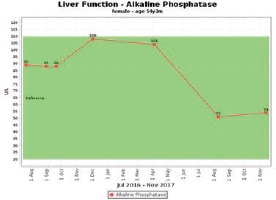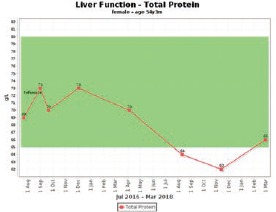Abstract
Faced with chronic inflammation for number of years, unable to work and mostly bed bound, this fifty-two year old woman decided to look elsewhere for answers after exhausting all allopathic medical support. As symptoms cascaded, medications increased. She felt herself at a point of no return as she started to question herself what may be propelling her inflammatory pathway.
Systematic case taking, historical blood tests provided substantial information on the extent of organ stress that can result in problems such as hers.
The client presented with chronic fatigue and extreme body pain. She had been diagnosed with a granulosa cell tumour in 2011. Subsequent to that she developed various ongoing health issues which were not eliminated by regular treatments. Inflammation was rampant.
The client believed in herself and was committed to making extensive behavioural, dietary and lifestyle changes to improve her health. Regular monitoring of blood parameters and vital signs, by both her primary health providers and by us, gave her confidence to adhere strongly to the customised protocol we created for her, which enabled her to return to wellness.
Introduction
Toxicity - Inflammation evolves acute to chronic pain followed by cascades of variant inflammatory responses. Precisely, this client was facing a continual quantum of unresolved inflammatory responses that she was subjected to. A broad range of inflammatory chemicals can directly activate pain-sensing nerve fibres, including bradykinins, prostaglandins, histamine and cytokines like interleukins and TNF. The amplifying nature of these chemicals drives inflammation to rage out of control, generating chronic pain.
Patient Information
A 52 year old Caucasian female presented with chronic inflammation. Additionally, she had been medically diagnosed with the following conditions:
Chronic Fatigue
Granulosa cell tumour
Eczema
Glandular fever
Bursitis in shoulder and arm
Elevated Blood pressure
Furthermore she noted the following additional challenges:
Weight gain
Chronic constipation.
Upon examination of her lab results she was also found to have a deficiency in iron.
Timeline.

Past interventions
Carpal tunnel surgery in 1986
Surgical removal of Granulosa cell tumour in May 2011
Hysterectomy in August 2011
Hernia surgery in September 2016
Following the hysterectomy, inflammation was rampant. She was on the following anticonvulsant, antidepressant and analgesic medications, targeting chronic pain:
Gabapentin Ca 300 mg
Amitriptyline 10 mg
Amlodipine 2.5 mg
Paracetamol
However she wasn’t getting the relief that she needed.
Clinical Findings
Detailed case taking did provide the following information on the patient’s timeline. furthermore blood pressure, body size measurements, weight, was taken. The findings are discussed below.
Diagnostic Assessment
Case taking
Past Blood tests examined
Blood tests ordered
Live Blood Screening
Bio Energy Screening
Therapeutic Intervention
The client was committed to a period of holistic wellness plan, including a customised protocol developed to target the acidity of the matrix, which dictates organ wellness. She visited the clinic twice a week for regular monitoring of her vital signs (weight, size, blood pressure, pH, temperature) and pain management treatment.
Nutritional Intervention
A dietary plan was introduced, specifically eliminating inflammatory foods such as sugar, wheat, gluten and dairy. The plan focused on low glycemic food and an elemental fat loss program. A number of high strength nutritional supplements were included, as was a comprehensive detox program to support the organs of elimination; lymph nodes, liver and kidneys. Complimentary supplements were recommended to support cardiac system, reduce inflammation, and support the immune, bowel, digestive and hormonal systems.
Pain Management
The SCENAR (Self Controlled Energo Neuro Adaptive Regulator) therapy was administered bi-weekly to manage the client’s pain during the course of the protocol.
Changes in Intervention
Over the course of treatment, improvements were noticed in the client’s clinical biomarkers. She also experienced noticeable physical improvements. Pain levels reduced to negligible amounts. She “felt like her normal self again”. As this happened most of the supplements were scaled down. Only some core supplements that supported her ongoing wellness were maintained at the same levels, as follows:
Lactobacillus plantarum 299v
Optimal Gastrointestinal, Hepatic & Inflammatory support formula
High Purity, Low Refux, Concentrated Fish Oil
Glyconutrients
Cow Colostrum and Egg Yolk Peptide Extracts
High Potency Vegetarian Iron with 5-MTHF
Follow-up and Outcomes
Patient-Assessed Outcomes
The client now reports that she is:
Able to hold down her regular job without much sick leave;
Able to dream again;
Feeling confident with the increase of energy;
Walking daily and exercising for 30 minutes, which she wasn’t able to do before;
Having regular bowel motions; and
Able to sleep and awaken without chronic body pain.
Diagnostic Test Results
Blood markers were measured during the course of treatment and compared against historical results taken before the start of treatment. Notable results include the normalisation of ALP, ALT, AST and GGT, along with changes to Triglycerides and Total Cholesterol which were brought much closer to recommended levels. Finally the Total Body Weight and Waist Diameter were reduced.
Intervention Adherence and Tolerability
The client didn’t notice any negative effects as a consequence of the protocol. This, along with her steadily improving markers ensured her adherence to the protocol. She continued to experience great well being and began to feel her normal self.
Adverse and Unanticipated Events
The client responded positively to the customised protocol without any adverse reactions.
Discussion
This 52 year old female was completely committed to becoming well. When she observed the initial rapid physical changes:
increase in energy
increased ability to do her daily chores which she couldn’t do for a long time
ability to get out of bed every morning as a normal person would do
this made her more determined to continue with the therapy and achieve her greatest possible level of wellness.
This wellness approach may not have worked in the client’s favour if she had not seen the physical and clinical improvements as soon as she did. Constant moral support and assurance from her practirioners were also a large factor in building her resilence.
It is becoming a well known phenomenon that inflammation is behind chronic disease.i But how far we go to resolve the challenge is critical. As discussed, conventional and integrative remedies may attenuate the chemical mediators but fall short of actually resolving the condition. Together with an improved clinical approach, holistic care does identify and control the underlying inflammatory drives to bring about a resolution to a system that has gone through years of unmitigated inflammation.
Intrinsically this case study mirrors the above scenario.
Patient Perspective
Summarising with her personal words, the client is “getting up one morning and thinking life is worth living again”.
Figure 1.

Weight
Figure 2.

Waist diameter
Figure 3.

Triglyceride
Figure 4.

Cholesterol
Figure 5.

ALT and AST
Figure 6.

ALP
Figure 7.

GGT
Figure 8.

Total Protein
Table 2.
Supplements
| Nutritional Supplement | Dosage | Purpose |
|---|---|---|
| Homeotoxicology Detox System | 30 drops daily | Excretion and detoxification support for the lymphatic, hepatic and renal systems |
| Lactobacillus plantarum 299v | 1/3 tsp BD | To reduce inflammation in the gut |
| Optimal Gastrointestinal, Hepatic & Inflammatory support formula | 2 scoops daily | To inhibit phase 1 detoxification, up-regulate and support phase 2 pathways, and provide antioxidant support |
| High Purity, Low Refux, Concentrated Fish Oil | 2 caps BD | High potency EPA/DHA to assist with multiple anti-inflammatory mechanisms |
| Enhanced Bio availability Coenzyme Q10 150 mg | 1 cap daily | To reduce oxidation and support heart health and cellular energy production |
| Glyconutrients | 1 tsp BD | To support cellular integrity |
| Vitamin D3 | 2 drops daily | Vitamin D support |
| High Potency Anti-infammatory Herbs | 3 caps BD | For the management of pain and mild inflammation |
| Cow Colostrum and Egg Yolk Peptide Extracts | 3 caps BD | Immune modulation |
| Lycium Hypothyroid Support | 2 tablets BD | Maintenance of normal healthy thyroid function and metabolism |
| Digestive Enzymes | 2 caps TD before food | To support digestion |
| High Potency Vegetarian Iron with 5-MTHF | 1 cap daily | Enhanced bio availability, high potency iron with active B12 and 5-MTHF |
| Liposomal Antioxidants | 2 tsp daily | Antioxidant support |
Acknowledgements
Dayandra Hettige, Husband and practitioner who works tirelessly, researching extensively and engaging in constant study to bring about wellness resolution to all clients who seek it.
Julian Wright, our IT specialist, for all his expert advice and developing a software system to monitor and manage clients’ wellness information. Also for his editing skills.
No grant or other financial support was used for this study.
Appendix. Raw Patient Data
Table A1.
Body Measurements
| Date | Waist diameter (cm) |
Weight (kg) |
|---|---|---|
| 16 Jun 2017 | 116 | 91.6 |
| 26 Jun 2017 | 114 | 89.9 |
| 5 Jul 2017 | 112 | 89.3 |
| 10 Jul 2017 | 112 | 87.3 |
| 17 Jul 2017 | 111 | 86.7 |
| 24 Jul 2017 | 105 | 85.7 |
| 31 Jul 2017 | 107 | 84.7 |
| 17 Aug 2017 | 100 | 81.5 |
| 21 Aug 2017 | 104 | 82.4 |
| 28 Aug 2017 | 99 | 81.8 |
| 13 Sep 2017 | 97 | 78.6 |
| 22 Sep 2017 | 104 | 79.6 |
| 28 Sep 2017 | 101 | 77.9 |
| 12 Oct 2017 | 101 | 77.3 |
| 19 Oct 2017 | 96.5 | 75.9 |
| 30 Oct 2017 | 96 | 75.2 |
| 8 Nov 2017 | 97 | 75 |
| 24 Nov 2017 | 94 | 71.8 |
| 27 Nov 2017 | 93 | 71.05 |
| 11 Dec 2017 | 93 | 70.7 |
| 2 Jan 2018 | 93 | 70.5 |
| 10 Jan 2018 | 71.1 | |
| 12 Jan 2018 | 70.65 | |
| 20 Jan 2018 | 69.7 | |
| 5 Feb 2018 | 70.4 | |
| 9 Feb 2018 | 92 | 70.25 |
| 19 Feb 2018 | 70.25 | |
| 28 Feb 2018 | 69.2 | |
| 7 Mar 2018 | 69.45 | |
| 10 Mar 2018 | 91 | 69.45 |
| 11 Apr 2018 | 92 | 69.25 |
| 16 Apr 2018 | 91 | 69.25 |
| 5 May 2018 | 68.45 | |
| 19 May 2018 | 90 | 66.75 |
| 26 May 2018 | 90 | 66.55 |
Table A2.
Cholesterol Markers
| Date | Cholesterol mmol/L |
LDL mmol/L |
Triglyceride mmol/L |
|---|---|---|---|
| 16 May 2016 | 5.2 | 2.8 | 1.9 |
| 2 Dec 2016 | 5.8 | 3.3 | 1.9 |
| 10 Aug 2017 | 4 | 1.9 | 1.1 |
| 13 Nov 2017 | 3.7 | 1.7 | 0.5 |
Table A3.
Liver Function Markers
| Date | ALT U/L |
AST U/L |
ALP U/L |
Total Protein g/L |
GGT U/L |
|---|---|---|---|---|---|
| 22 Jul 2016 | 101 | 49 | 89 | 69 | 132 |
| 31 Aug 2016 | 66 | 35 | 88 | 73 | 86 |
| 20 Sep 2016 | 86 | 35 | 88 | 70 | 82 |
| 2 Dec 2016 | 57 | 30 | 108 | 73 | 164 |
| 4 Apr 2017 | 77 | 41 | 104 | 70 | 107 |
| 10 Aug 2017 | 28 | 19 | 51 | 64 | 12 |
| 13 Nov 2017 | 24 | 20 | 54 | 62 | 15 |
| 28 Feb 2018 | 32 | 26 | 69 | 66 | 15 |
Footnotes
i. Metagenics Clinical Seminar, (June-July 2019) Executive Summary. Resolving Chronic Inflammation, p. 4


